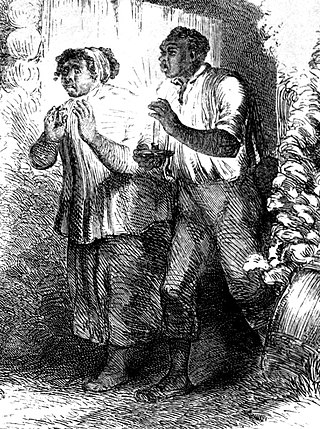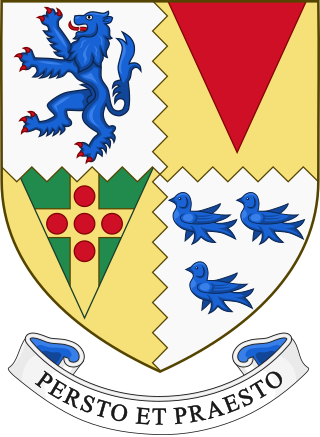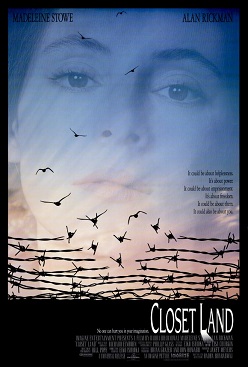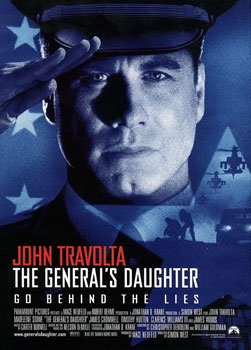Related Research Articles

Uncle Tom is the title character of Harriet Beecher Stowe's 1852 novel Uncle Tom's Cabin. The character was seen in the Victorian era as a ground-breaking literary attack against the dehumanization of slaves. Tom is a deeply religious Christian preacher to his fellow slaves who uses nonresistance, but who is willingly flogged to death rather than violate the plantation's code of silence by informing against the route being used by two women who have just escaped from slavery. However, the character also came to be criticized for allegedly being inexplicably kind to white slaveowners, especially based on his portrayal in pro-compassion dramatizations. This led to the use of Uncle Tom – sometimes shortened to just a Tom – as a derogatory epithet for an exceedingly subservient person or house negro, particularly one accepting and uncritical of his or her own lower-class status.

Uncle Tom's Cabin; or, Life Among the Lowly is an anti-slavery novel by American author Harriet Beecher Stowe. Published in two volumes in 1852, the novel had a profound effect on attitudes toward African Americans and slavery in the U.S., and is said to have "helped lay the groundwork for the [American] Civil War".

Madeleine Marie Stowe Mora is an American actress. She appeared mostly on television before her role in the 1987 crime-comedy film Stakeout. She went on to star in the films Revenge (1990), Unlawful Entry (1992), The Last of the Mohicans (1992), Blink (1993), 12 Monkeys (1995), The General's Daughter (1999), and We Were Soldiers (2002). For her role in the 1993 independent film Short Cuts, she won the National Society of Film Critics Award for Best Supporting Actress.

Stowe is a civil parish and former village about two miles northwest of Buckingham in the unitary authority area of Buckinghamshire, England. The parish includes the hamlets of Boycott, Dadford and Lamport.

Dame Mary Louise Webster,, known professionally as May Whitty and later, for her charity work, Dame May Whitty, was an English stage and film actress. She was one of the first two women entertainers to become a Dame. The British actors' union Equity was established in her home in 1930.
George Richard Wilson Knight (1897–1985) was an English literary critic and academic, known particularly for his interpretation of mythic content in literature, and The Wheel of Fire, a collection of essays on Shakespeare's plays. He was also an actor and theatrical director, and considered an outstanding lecturer.

Stowe School is a public school for pupils aged 13–18 in Stowe, England. It opened on 11 May 1923, initially with 99 schoolboys, and with J. F. Roxburgh as the first headmaster. The school is a member of the 18 member Rugby Group, the Headmasters' and Headmistresses' Conference, and the G30 Schools' Group. Originally for boys only, the school is now coeducational, with 541 boys and 374 girls - 915 students enrolled in the school as of September 2023.

Una O'Connor was an Irish-born American actress who worked extensively in theatre before becoming a character actress in film and in television. She often portrayed comical wives, housekeepers and servants. In 2020, she was listed at number 19 on The Irish Times list of Ireland's greatest film actors.
George Thomas Moore Marriott was an English character actor best remembered for the series of films he made with Will Hay. His first appearance with Hay was in the film Dandy Dick (1935), but he was a significant supporting performer in Hay's films from 1936 to 1940, and while he starred with Hay during this period he played a character called "Harbottle" that was based on a character Marriott usually played. His character Harbottle was originally created by Hay when he used the character in his "The fourth form at St. Michael's" sketches in the 1920s.

Major General John Hay Beith, CBE MC, was a British schoolmaster and soldier, but is best remembered as a novelist, playwright, essayist, and historian who wrote under the pen name Ian Hay.

Closet Land is a 1991 independent film written and directed by Radha Bharadwaj. The film stars Madeleine Stowe as a young author of children's books and Alan Rickman as a sadistic secret policeman who is interrogating her. The film was released to mixed reviews.

The General's Daughter is a 1999 American mystery thriller film directed by Simon West from a screenplay co-written by Christopher Bertolini and William Goldman, based on the novel of the same name by Nelson DeMille. It stars John Travolta, Madeleine Stowe, James Cromwell, Timothy Hutton, Clarence Williams III, and James Woods. The plot concerns the mysterious death of the daughter of a prominent Army general. The General's Daughter received negative reviews from critics, but was a box-office success, grossing $149.7 million worldwide against an estimated budget of $60 to $95 million.

The Arts Theatre is a theatre in Great Newport Street, in Westminster, Central London.

Tom show is a general term for any play or musical based on the 1852 novel Uncle Tom's Cabin by Harriet Beecher Stowe. The novel attempts to depict the harsh reality of slavery. Due to the weak copyright laws at the time, a number of unauthorized plays based on the novel were staged for decades, many of them mocking the novel's social message, and leading to the pejorative term "Uncle Tom".
George Dewey Hay was an American radio personality, announcer and newspaper reporter. He was the founder of the original Grand Ole Opry radio program on WSM-AM in Nashville, Tennessee, from which the country music stage show of the same name evolved.

The Bold Ones: The Senator is an American political television drama series that aired on NBC from 1970 through 1971, lasting for nine episodes. The series stars Hal Holbrook as Senator Hays Stowe, an idealistic crusader of political and social issues.
A Song of Sixpence is a 1930 British comedy play by the writers Ian Hay and Guy Bolton. Set in Scotland, it tells the story of three wives who rebel against their tight-fisted husbands.

Off the Record is a 1947 British comedy play by Ian Hay and Stephen King-Hall. It is a farce about the Royal Navy.
A Safety Match is a 1921 play by the British writer Ian Hay, adapted from his own 1911 novel of the same title.
Leave it to Psmith, subtitled "A comedy of youth, love and misadventure", is a 1930 comedy play by Ian Hay and P. G. Wodehouse, based on the latter's 1923 novel of the same title. It premiered in London's West End at the Shaftesbury Theatre on 29 September 1930.
References
- ↑ Wearing p.484